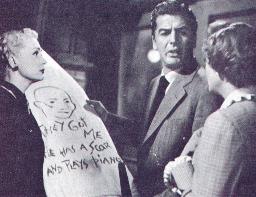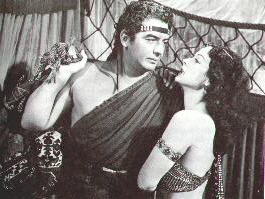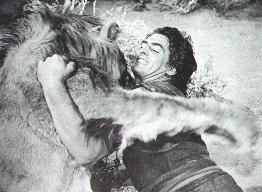

In Yuma, Arizona, on Saturday, February 28, 1948, five days after completing work on Cry of the City, Victor married a non-professional, the blonde and pretty Dorothy Stanford Berry. They had met the previous summer at Laguna Beach, and Dorothy later recalled, "I thought he was wonderful. Right from the first! It may not have been love at first sight, but he was so alive and exciting! And, we seemed to enjoy all the same things." The marriage was performed by a justice of the peace and witnessed by Bud and Ella Evans; Dorothy wore a white gabardine dress which Victor had given her. He wore a blue sport shirt, a blue sport coat with tan slacks and over-sized white tennis shoes that afforded comfort for his healing toes. After a two-day honeymoon at the Del Mar Hotel in Yuma, they returned to West Los Angeles, where they were joined by Dorothy's son of her previous marriage, five-year-old Mike. Dorothy remarked a few days after the wedding, "All I can think is that my life before Vic must have been a very empty existence."
In July, 1948, Mature was named by Lucia Carroll Schroeder in the case of her divorce from Carl Schroeder, Victor's former roommate. Mrs. Schroeder stated, "Victor Mature had the habit of calling him day or night. He'd go right over. On Christmas day, 1946, Victor Mature called in the middle of the day and he [Carl] left and was gone all afternoon and evening."
A few months later in October, 1948, Victor was selected by the International Artists Committee as one of the five most virile men in America. (His weight that year reached an all-time high for him--232 pounds.) On December 2, 1948, his voice was heard on CBS radio in "The Hallmark Playhouse" presentation of Old Man Minick, narrated by host and author James Hilton.
For his overdue loanout to RKO, Victor showed up in 1949's Easy Living (originally entitled Interference) as an aging professional gridiron hero whose selfish, overambitious wife (Lizabeth Scott) prevents him from accepting a secure job as a college coach. Ordered, due to a heart condition, to quit throwing the pigskin, he slugs his pretty wife and tells her that she will play ball his way and accompany him to a small town, or else! She goes, but no one in the audience really cared who did what to whom by the end of the dull seventy-seven-minute feature. Seen in supporting roles were Lucille Ball as the faithful sports club secretary and Sonny Tufts as the halfback's best pal.
Right after Easy Living came Red, Hot and Blue (1949), which Victor made on loanout to Paramount. He appeared in a role that had been rejected by Ray Milland. First entitled The Broadway Story, then Restless Angel, the script has Victor as an arty stage director struggling to make a name for himself and to overcome the notoriety of having dizzy showgirl Eleanor Collier (Betty Hutton) as his girlfriend. Mature's serious-minded Danny James is aghast when Hutton's Eleanor gets involved in a (comedy) gangland murder and must fight her way through mobster complications with the help of bemused Mature. The rambunctious blonde bombshell had four Frank Loesser tunes to belt out (including "Hamlet" and "I Wake up in the Morning Feeling Fine"), which allowed Mature plenty of time to relax between numbers. Although the Damon Runyon-like film was of little consequence, Mature offered a more than adequate interpretation in his straight-guy characterization, supplying "some substance to support the fuss-'n-feathers script" (Variety).
Mature's Red, Hot and Blue Paramount deal had come about because he was already on the Marathon Street lot for Samson and Delilah (1949), which had already been filmed, but was released after the Betty Hutton musical.
Screen epics had always been Cecil B. DeMille's forte. In the mid-1930s he had planned to film the story of Samson and Delilah with Henry Wilcoxon and Miriam Hopkins starred, but these plans were dropped, partially because he was unable to substantiate the meeting of the Old Testament muscle man and the delectable temptress. Then, he discovered Vladimir Jabotinsky's book, Judge and Fool, which described Delilah as the younger sister of the Philistine beauty Semadar, who had rejected Samson's marriage proposal. DeMille convinced Paramount to acquire the screen rights to the novel at a cost of $5,000, and set about composing a screenplay with Jesse L. Lasky, Jr. and Frederic M. Frank.
Burt Lancaster, the Hal B. Wallis-Paramount contractee, had been DeMille's tentative choice as Samson, but he was rejected after DeMille viewed Kiss of Death and took measure of Mature's acting as well as his girth. He borrowed him from Fox for the sum of $100,000 (half went to Victor). Immediately, Victor was dispatched to the Paramount gym where he underwent weeks of intensive training with a physical conditioner named Joe Davies, to whom DeMille paid $250 weekly. In November, 1948, soon after the filming began, Victor bared his torso for Hedda Hopper and said, "Get a load of Samson. Darryl Zanuck won't recognize me when I get back on the home lot. I've lost eighteen pounds [bringing his weight down to 214 pounds] and I've learned to throw those biceps."
From the start of production, DeMille referred to Samson and Delilah as "a story of the power of prayer," a tag line that became the feature's motto. However, whatever prayers DeMille uttered asking that courage be bestowed upon Victor in facing a real lion in controlled combat were not powerful enough to be heard. Mature flatly refused to grapple with a live lion and said, "Look, C.B., there's only one Mature and I would hate to see him go this way." Against DeMille's better judgment ("I never use stuffed animals in my pictures if it can be helped"), the lion that Victor met in combat, indeed, came from a taxidermist. The scene, filmed on a closed set, with guards posted at all doors to prevent leakage of DeMille's embarrassing compromise, began with a live, snarling, "tame" lion's appearance on top of a rock. When Samson is handed a spear by Delilah (Hedy Lamarr), he says, "I don't need that. He's only a young lion." At the film's New York opening, the dialog line was met with gales of laughter. Against his wishes, DeMille was forced to delete it from the final release print. Hedy Lamarr, in her 1966 Bartholomew House autobiography Ecstasy and Me, wrote: "Once, when I thought Victor was upstaging me--which, with his great size, was always a problem--I complained to Mr. DeMille. 'Victor always works it so that it's his face and my back to the camera, and you are not using reverse shots.' The director knew how to mollify me on that point: 'Do you think there are any men in America who would rather look at his face than your ass?'"


